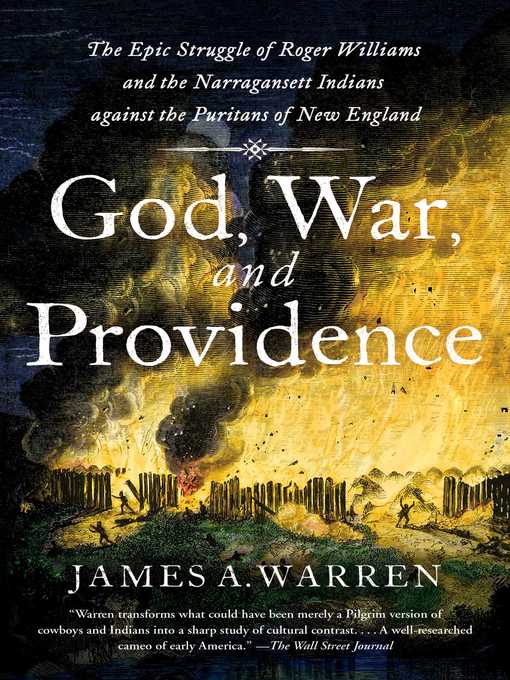
God, War, and Providence
The Epic Struggle of Roger Williams and the Narragansett Indians against the Puritans of New England
- اطلاعات
- نقد و بررسی
- دیدگاه کاربران
نقد و بررسی

April 15, 2018
A historian revisits the bloody confrontations between American Indians and New England colonists in the mid-17th century, finding much behavior to deplore but one leader to admire.Daily Beast contributor Warren (Giap: The General Who Defeated America in Vietnam, 2013, etc.) relies heavily (and explicitly) on the previous works of historians of the era, quoting extensively. But he also uses his contemporary viewpoint to analyze conflicts between the natives and the newer arrivals from England. Emerging as a towering figure of tolerance is Roger Williams (1603-1683), the Puritan minister who was determined to understand the local Narragansett and advocate for religious freedom and cultural tolerance. As Warren shows us--after rightly noting that the voices of the Indians are too often silent in the historical record--Williams, after establishing the Rhode Island colony, worked tirelessly on behalf of all; it was only when Puritan expansionism (and rampant lying and greed) grew intolerable that frontier warfare erupted. The fighting ended with predictable results, with mere numbers and superior firepower being the keys. Warren distinguishes himself by trying to understand all the motives of the principal players in this sad, sanguinary drama, but, as he reveals, it was basically the oldest story of all: people who believe their God is the only true one slaughtering those who beg to differ--and arrogating for themselves the losers' lands and property. There are several simultaneous stories going on, and the author handles them all deftly: Williams (his banishment from Massachusetts, his establishment of Rhode Island), the power of the Massachusetts and Connecticut Puritans, the struggles of the various Indian tribes in the region, the bloody battles, and colonial historiography in general.A solid book of American history that will cause readers to grimace at the fire and fury and perhaps blush with shame for the suffering and the shamelessness.
COPYRIGHT(2018) Kirkus Reviews, ALL RIGHTS RESERVED.

April 16, 2018
In this straightforward account of colonial New England, Warren (American Spartans) brings new attention to the alliance between the Narragansett Indians and the Baptist minister Roger Williams’s Rhode Island settlement. Each community faced antagonism from Puritan leaders, who viewed Native Americans as culturally inferior and rejected Williams’s efforts to increase religious liberty and to separate church and state. As Warren shows, Williams was intensely interested in Native traditions and beliefs, which he found to be more moral than those of most English settlers. In his writings and political work, Williams sought to inculcate respect for cultural difference, often acting as a mediator between Puritan and Narragansett communities. Although Warren claims that Williams and the Narragansett engaged in joint struggle against the Puritans, it’s Williams who receives the most attention and is most fully developed here. Readers wanting to learn more about Native resistance and its culmination in the mid-17th-century King Philip’s War may wish to look elsewhere, but Warren’s book provides a good introduction to key players in Native-settler conflicts, and his clear prose will certainly draw in readers. Agent: John F. Thornton, the Spieler Agency.

May 15, 2018
Minister and abolitionist Roger Williams's (1603-83) poor relationship with the Puritans, in particular John Winthrop, ultimately led to his banishment from the Massachusetts Bay Colony in 1635. He and his followers subsequently established Rhode Island on lands purchased from the Narragansett. When Puritans began to war with the Narragansett, Williams sided with his Native neighbors. Warren (Giap: The General Who Defeated America in Vietnam) explores the relationship between Williams and the Narragansett to illustrate that mutual cooperation and respect between the two groups was possible, but that the Puritans' unwillingness to perceive of a world in which their views were not predominant led to the ruin of the Native New Englanders, especially at the conclusion of King Philip's War. VERDICT Warren's well-written monograph contains a great deal of insight into the tactics of war on the frontier. Readers interested in Williams would be better served by John M. Barry's scholarly Roger Williams and the Creation of the American Soul. On the Narragansett during the period in question, Lisa Brooks's Our Beloved Kin is a must-read.--John R. Burch, Univ. of Tennessee at Martin
Copyright 2018 Library Journal, LLC Used with permission.




دیدگاه کاربران